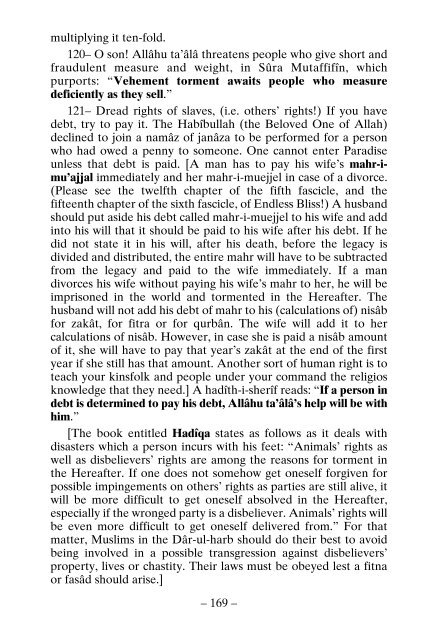O Son !
THE BOOK ‘O SON’ Al-hamdu lillâhi Rabbil ’âlamîn. Wa-s-salâtu wa-s-salâmu ’alâ Rasûlinâ Muhammadin wa Âlihi wa Sahbihi ajma’în. 1– O son! Collecting from books written by the scholars of the Hanafî Madhhab three hundred and sixty hadîth-i-sherîfs and forty-four khabars and also the seven essentials and the five rukns and the seven wâjibs and the fourteen sunnats and the twenty-five mustahabs and the fourteen mufsids of namâz, I have explained them for you. Adapt your acts and deeds to these teachings so that you attain fayz and nejât (salvation)! 2– Also for your information, I have collected a thousand and ninety âdâb (adabs) for you and for other young Muslims like you. If you adapt your actions and acts of worship to these teachings, they will be sufficient for you. If you laze, disobey Allâhu ta’âlâ and cease from these practices and manners, you will be afflicted with slavery and disgrace in the world and subjected to torment in the world to come. If you live up to them and advise your Muslim brothers to do the same, it will be useful for you. They will say blessings over you. And Haqq ta’âlâ will accept their invocations. For, a slave will be pardoned on account of another slave’s invocations for them.
THE BOOK ‘O SON’
Al-hamdu lillâhi Rabbil ’âlamîn. Wa-s-salâtu wa-s-salâmu ’alâ
Rasûlinâ Muhammadin wa Âlihi wa Sahbihi ajma’în.
1– O son! Collecting from books written by the scholars of the
Hanafî Madhhab three hundred and sixty hadîth-i-sherîfs and
forty-four khabars and also the seven essentials and the five rukns
and the seven wâjibs and the fourteen sunnats and the twenty-five
mustahabs and the fourteen mufsids of namâz, I have explained
them for you. Adapt your acts and deeds to these teachings so that
you attain fayz and nejât (salvation)!
2– Also for your information, I have collected a thousand and
ninety âdâb (adabs) for you and for other young Muslims like you.
If you adapt your actions and acts of worship to these teachings,
they will be sufficient for you. If you laze, disobey Allâhu ta’âlâ
and cease from these practices and manners, you will be afflicted
with slavery and disgrace in the world and subjected to torment in
the world to come.
If you live up to them and advise your Muslim brothers to do
the same, it will be useful for you. They will say blessings over you.
And Haqq ta’âlâ will accept their invocations. For, a slave will be
pardoned on account of another slave’s invocations for them.
You also want an ePaper? Increase the reach of your titles
YUMPU automatically turns print PDFs into web optimized ePapers that Google loves.
multiplying it ten-fold.<br />
120– O son! Allâhu ta’âlâ threatens people who give short and<br />
fraudulent measure and weight, in Sûra Mutaffifîn, which<br />
purports: “Vehement torment awaits people who measure<br />
deficiently as they sell.”<br />
121– Dread rights of slaves, (i.e. others’ rights!) If you have<br />
debt, try to pay it. The Habîbullah (the Beloved One of Allah)<br />
declined to join a namâz of janâza to be performed for a person<br />
who had owed a penny to someone. One cannot enter Paradise<br />
unless that debt is paid. [A man has to pay his wife’s mahr-imu’ajjal<br />
immediately and her mahr-i-muejjel in case of a divorce.<br />
(Please see the twelfth chapter of the fifth fascicle, and the<br />
fifteenth chapter of the sixth fascicle, of Endless Bliss!) A husband<br />
should put aside his debt called mahr-i-muejjel to his wife and add<br />
into his will that it should be paid to his wife after his debt. If he<br />
did not state it in his will, after his death, before the legacy is<br />
divided and distributed, the entire mahr will have to be subtracted<br />
from the legacy and paid to the wife immediately. If a man<br />
divorces his wife without paying his wife’s mahr to her, he will be<br />
imprisoned in the world and tormented in the Hereafter. The<br />
husband will not add his debt of mahr to his (calculations of) nisâb<br />
for zakât, for fitra or for qurbân. The wife will add it to her<br />
calculations of nisâb. However, in case she is paid a nisâb amount<br />
of it, she will have to pay that year’s zakât at the end of the first<br />
year if she still has that amount. Another sort of human right is to<br />
teach your kinsfolk and people under your command the religios<br />
knowledge that they need.] A hadîth-i-sherîf reads: “If a person in<br />
debt is determined to pay his debt, Allâhu ta’âlâ’s help will be with<br />
him.”<br />
[The book entitled Hadîqa states as follows as it deals with<br />
disasters which a person incurs with his feet: “Animals’ rights as<br />
well as disbelievers’ rights are among the reasons for torment in<br />
the Hereafter. If one does not somehow get oneself forgiven for<br />
possible impingements on others’ rights as parties are still alive, it<br />
will be more difficult to get oneself absolved in the Hereafter,<br />
especially if the wronged party is a disbeliever. Animals’ rights will<br />
be even more difficult to get oneself delivered from.” For that<br />
matter, Muslims in the Dâr-ul-harb should do their best to avoid<br />
being involved in a possible transgression against disbelievers’<br />
property, lives or chastity. Their laws must be obeyed lest a fitna<br />
or fasâd should arise.]<br />
– 169 –

















